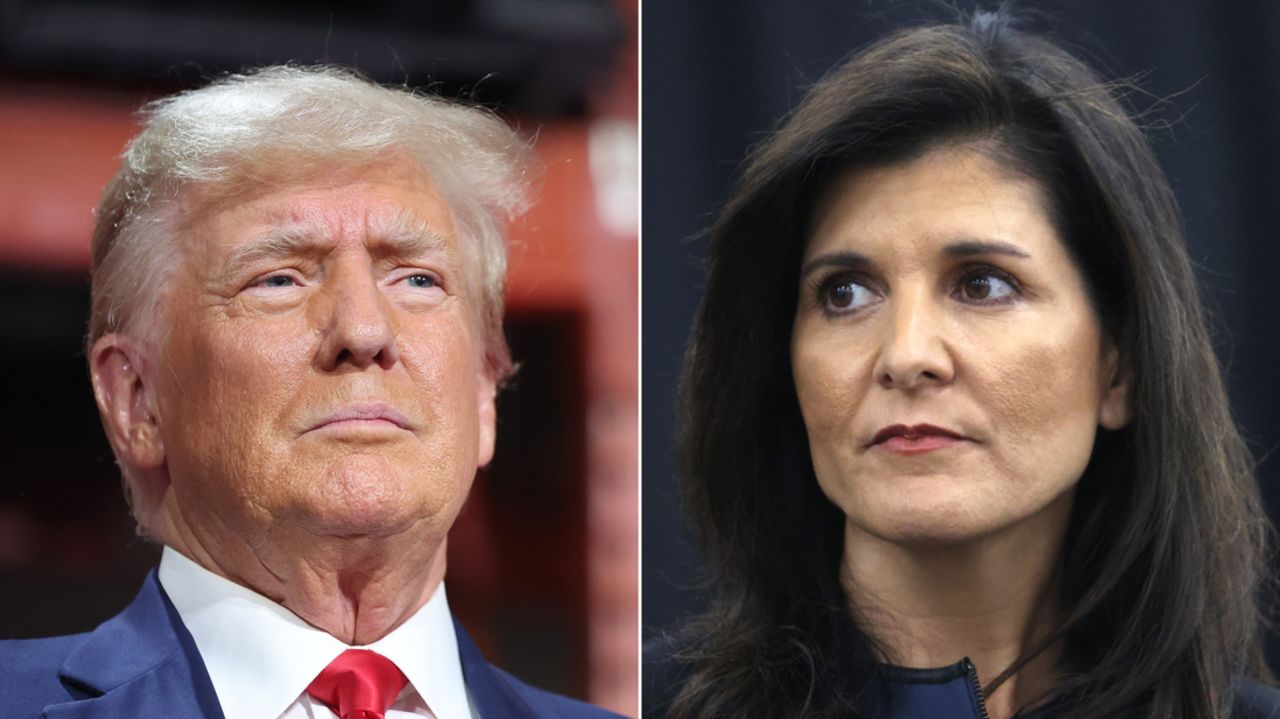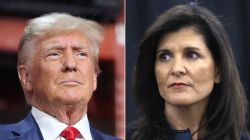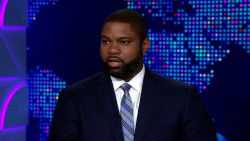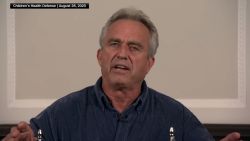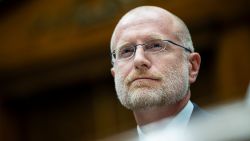Former South Carolina Gov. Nikki Haley has trimmed former President Donald Trump’s lead in the Republican primary race in New Hampshire to single digits, according to a new CNN Poll conducted by the University of New Hampshire.
Trump still holds a meaningful lead in the poll, with the backing of 39% of likely Republican primary voters in New Hampshire compared to Haley’s 32%. The rest of the field lags far behind in the poll, with former New Jersey Gov. Chris Christie at 12%, entrepreneur Vivek Ramaswamy at 8%, Florida Gov. Ron DeSantis at 5% and former Arkansas Gov. Asa Hutchinson at less than 1%.
Support for Haley has risen 12 percentage points since the last CNN/UNH poll in November, continuing an upward trajectory that began last summer, while her opponents –- including Trump – have seen their numbers remain stable or tick slightly downward since autumn.
Haley’s support has grown dramatically among those voters registered as undeclared, New Hampshire’s term for independent registrants – she’s up 18 points with this group since November. It has also grown 20 points among those who are ideologically moderate. Those gains come amid a push from her campaign in the state, including an endorsement last month from New Hampshire Gov. Chris Sununu. The Granite State’s GOP primary is January 23.
The strength of Haley’s challenge to Trump in the state speaks to the contours of New Hampshire’s primary electorate, in which those more moderate and less staunchly partisan voters make up a larger share of participants than they do in Iowa’s first-in-the-nation caucuses, which are happening next week. Trump has crossed the 50% mark in most recent polling on the Iowa caucuses, and he holds wider majorities in national polls on the Republican nomination.
A little more than 4 in 10 likely primary voters in the CNN/UNH poll are undeclared voters who plan to vote in the GOP primary (45%), rather than registered Republicans. About one-third describe themselves as moderates (32%).
Trump leads Haley by 40 percentage points among conservatives, by 37 points among registered Republicans and by 17 points among those without college degrees, the poll finds. But Haley tops Trump by 42 points among moderates, 26 points among undeclared voters and 12 points among college graduates. Christie lands in second between Haley and Trump among each of those three groups.
Haley’s supporters, however, remain less solidly committed than Trump’s base. While 80% of voters backing Trump say they’ve definitely decided on him, a slim 54% majority of Haley’s current backers say the same.
Just 45% of those backing other candidates are decided, leaving room for further shifts in the race in the final two weeks of campaigning in the Granite State. Among those whose first choice for the nomination is neither Haley nor Trump, 36% say that Haley would be their second choice for the nomination, with 30% picking Trump as their top alternative. Those behind Christie break solidly toward Haley, with 65% saying they would support her were Christie not in the race, with fewer than 1 in 10 of his backers choosing any other candidate and 13% saying they would not vote. Christie has pushed back against calls from Haley allies to drop out, touting his direct opposition to Trump.
At present, only two Republican candidates are viewed more favorably than unfavorably by likely GOP primary voters in the state: Trump (47% favorable, 38% unfavorable) and Haley (39% favorable, 35% unfavorable), each of whom is viewed positively by less than half of the likely electorate.
Ratings for each of the major candidates now running have declined since last September. But DeSantis has seen a particularly notable decline: Just 29% now view him favorably, down from 44% early last autumn. Likely primary voters’ opinions of Ramaswamy are also negative, with their views of Hutchinson and Christie even further underwater.
Though only about 4 in 10 likely Republican primary voters in New Hampshire say they plan to vote for Trump, a 69% majority say they’re opposed to the ruling in neighboring Maine that Trump should not appear on the ballot based on the 14th Amendment’s “insurrectionist ban,” which Trump’s team is challenging. Just 23% say they support the decision by Maine Secretary of State Shenna Bellows, a Democrat, that Trump is ineligible to run in Maine’s GOP primary. Roughly three-quarters of likely Republican primary voters say they believe that partisan politics factored at least somewhat into the ruling, with 63% saying they factored “a lot” into the decision by Bellows. A minority of likely Republican primary voters (39%) say that Trump bears a great deal or a good amount of responsibility for “what happened at the U.S. Capitol” on January 6, 2021, when rioters entered the US Capitol during the certification of the 2020 election results.
Within the likely GOP electorate, there’s a significant divide between Trump’s supporters and those who don’t back the former president. Virtually all Trump supporters in New Hampshire strongly oppose the ruling blocking him from Maine’s ballot (99%), and just 3% say he bears much responsibility for the events of January 6. Views are less unanimous among those likely GOP primary voters who aren’t backing Trump. While half oppose the Maine ruling, 38% support it, with another 12% neutral or unsure. A 63% majority say Trump bears at least a good amount of responsibility for what happened on January 6.
There’s also a divide between Republican primary voters and the state’s residents as a whole. New Hampshire residents say, 49% to 42%, that they support the ruling that Trump is ineligible to run in Maine’s GOP primary, although a 54% majority also say they believe partisan politics factored at least somewhat into the decision. Most, 63%, say Trump bears a great deal or a good amount of responsibility for what happened on January 6.
President Joe Biden’s job approval rating in New Hampshire stands at 42%, with 57% disapproving, according to the poll.
Biden, who did not file to appear on New Hampshire’s primary ballot in order to comply with the Democratic National Committee’s delegate selection rules, nevertheless dominates the Democratic field: 69% of likely Democratic primary voters say they will write in his name, compared with 7% who plan to support Minnesota Rep. Dean Phillips and 6% who say they will vote for author Marianne Williamson.
About two-thirds of likely Democratic primary voters view Biden favorably (67%), with 16% viewing him unfavorably. Phillips’ favorability rating stands at just 10% among the likely electorate, with 30% viewing him unfavorably, and most neutral (24%) or unsure (36%). Williamson gets an 8% favorable rating, with half viewing her unfavorably.
The CNN New Hampshire poll was conducted online January 4-8 by the University of New Hampshire Survey Center. Results among the full sample of 1,864 New Hampshire adults drawn from a probability-based panel have a margin of sampling error of plus or minus 2.3 percentage points. Likely Republican and Democratic primary voters were identified through survey questions about their intention to vote. Results among 914 likely Republican primary voters have an error margin of plus or minus 3.2 percentage points. Results among 694 likely Democratic primary voters have an error margin of plus or minus 3.9 percentage points.

